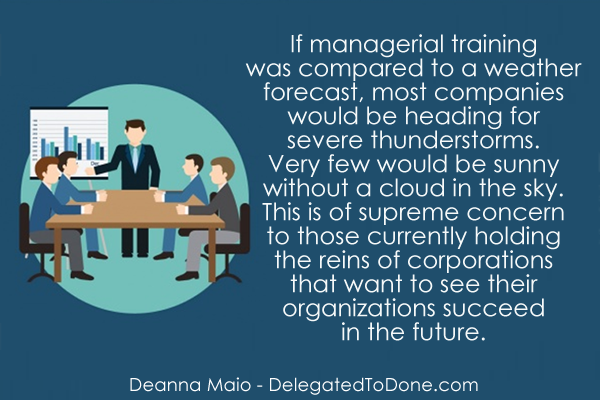If you asked a higher level executive what the managerial climate was within their company, could they tell you with any certainty? What would the managers themselves say? How about those who aspire to become managers? Every company should know their leadership competency at any given time. Otherwise, who will lead their organization into the future?
The Current Forecast
If managerial training was compared to a weather forecast, most companies would be heading for severe thunderstorms. Very few would be sunny without a cloud in the sky. This is of supreme concern to those currently holding the reins of corporations that want to see their organizations succeed in the future. Where will the leadership turn for enterprising management that can do the job? The answer should be within their organization, but some are not so sure.
The 7 Vital Managerial Skills
Unlike the seven deadly sins, these are attributes you want to cultivate within a successful company. The truth is that most companies don’t spend the time necessary to build a strong managerial staff. Either they are using outdated tools to evaluate progress or they are using none at all. “Winging it” is not exactly a constructive guideline. This includes both human resources and current managers.
In this way, new managers don’t stand a chance. But, there is hope. Adopting a current evaluation tool that not only assesses current skill level but also follows up with support and further feedback can change the climate of the managerial staff. Here are seven skills that all first-level managers should possess.
- Influencers – Moving from team member to manager is a scary process. Very few companies offer a concrete program to facilitate a smooth transition. This results in leading without the feeling of full authority. Managers need to be able to influence their team members and motivate them to a high level of performance.
- Political savvy – They can navigate the waters between HR concerns and hiring practices to bring in the right person for the company. Also, expressing concerns from team members to upper level management is a skill that results in change when successful.
- Teamwork – Building an atmosphere of shared culture within the team persuades them to adopt the values of the company as their own. It creates an investment in the staff that inspires loyalty.
- Relationship building – The ability to relate to team members, other departments and customers is a valuable asset in any manager. Someone who can foster long-term relationships provides stability.
- Collaboration – Working together across departments is often difficult. A manager who facilitates such joint projects is someone to emulate.
- Critical thinking skills – This involves learning how to problem solve and head off potential issues, all with the company’s goals and vision in mind.
- Learning agility – This is the ability to use your thinking skills to extrapolate solutions in situations that weren’t mentioned in the training manuals.
[Tweet “None of these skills will be visible without the proper transitional managerial program. Effective managers need training, guidance, support and follow-up to make sure they understand and embrace their new role. https://www.delegatedtodone.com/7-essential-skills-for-highly-effective-managers”]

